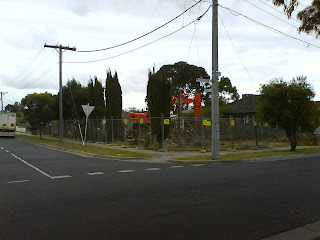I can’t really be sure why Hartington St has received this treatment. It would appear that a large part of it was early Housing Commission – back in the days when the HCV was worrying at the fringes of Broadmeadows but too nervous, well, too poor, really, to go in hard. Few people seem to value those early (1940s-early 50s) brick HCV homes, which is stupid, considering they are usually (depending on how big your family is, of course) of a workable size, reasonably comfortable and have big yards and effective storage space, etc. I assume it is these kinds of houses, in the main, which have been demolished for new things, though there are some quite sumptuous and unusual weatherboard places too. I hope that the rather lovely brick home currently being sold by Barry Plant is appreciated by its owner-to-be.
I also assume that, being right at the fringes of Moreland CC, the integrity of the streetscape of this area is not exactly high on Moreland’s showcase street list, though there are of course also limits to what Moreland could do even if it wanted to. I also also assume that the chief perceived advantage of Hartington St is its proximity to the Glenroy shopping strip (two supermarkets, some greengrocers, a NQR, two chemists at least, etc) and of course (?) the Glenroy railway station, which is at the end/ beginning of zone 1, depending where you're coming from. (The power station, which is depicted here, appeared in the TM Burke promotional film of 1923, Eight Pence a Day, as indisputible proof that electrification, and therefore modern technology, had been invested in the area).
As I age, or as the world gets stupider, I am becoming increasingly intolerant of inner city lifestyle choices. But it's true that when I lived in a flat in King St Newtown in the late 1980s there was no back yard and I didn’t give two hoots. I think almost everywhere else I’ve lived, though, there’s been a yard and I have tended to have pets, or lived with people who had pets. I accept, and I suppose I embraced it when I lived on King, that there is a payoff for proximity to the city or shops, etc that you have to live more compactly. But I cannot understand why anyone would want to live in Glenroy – a comfortable enough lower-middle class suburb, usually fairly quiet, agreeably diverse and relatively cheap to buy in – but live in a tiny bubble with no yard or space. If you are buying a box on a railway line to allow yourself a cheapish dormitory, then go further out; it gets a hell of a lot cheaper.
Like the residents of Glenroy, Mia and I don’t live in suburban sprawl; we live walking distance from a railway line constructed and operated consistently since the 1880s, and a town founded in the 1840s. So though I’ll put my hand up to being a suburbanite now by choice, and having been brought up in the suburbs too, I probably don’t know the worst aspects of the worst suburbia. But I genuinely believe that suburbia is where it’s at, and that all it needs (though it may never get it, particularly as people are so scared of their neighbours these days) is a kind of community culture based in geography/ local requirements. Cramming everyone together is fine at Docklands or those ghastly CBD apartments, particularly if you want to hear your neighbours' new Jet album for free or like the sound of them having sex (god, I'll never forget living next door to that opera singer in Egan St Newtown!). But there's no need to do it in a suburb. That's why we all want to live in Australia... I thought.











5 comments:
I wrote Barry Plant's resume. He has like seventeen kids.
Who he refers to as his seedlings.
That house needs some fine tuning with the the v-hold knob. Either that or it was built by a Tibetan carpetweaver.
Architecture - what's it good for? Absolutely nothing. Is that the correct spelling? I'm sure you will tell me!
If you need snaps for book give us a ring; my galfriend has many snaps - was snapper for RAM.
Stephen.
zpoYou are of the same state of mind as my wife. She likes being near amenities like supermarkets, movie theaters and parks, but when we lived in Hoboken, she absolutely could not stand the cramped urban lifestyle. There are Pacific Northwest cities that offer a good compromise - you can have a house in Portland or Vancouver, be reasonably near the city center but have a backyard and some space. Our neighborhood in St. Louis is like that as well.
I don't know if this happens in Australia, but in the US, the suburbs are spreading far beyond their original boundaries, to the point where they're 20 or 30 miles away from their city. Which brings up a good question: When does a suburb cease being a "suburb?" Places like Irvine, CA or Princeton, NJ have developed their own local economies over the years, to the extent that they're much less "sub" to any urban area. I'd definitely like to see more community and culture in such areas - I'm far beyond thinking the city is the ultimate in living, but that's still where the bands play and the cool bookstores usually are...
Post a Comment